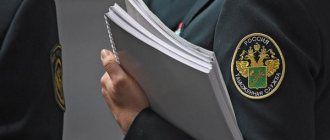Article 226.1. Code of Criminal Procedure of the Russian Federation. The basis and procedure for conducting an inquiry in an abbreviated form
- An inquiry in an abbreviated form is carried out in the manner established by Chapter 32 of this Code, with the exceptions provided for by this chapter.
- An inquiry in an abbreviated form is carried out on the basis of a request from a suspect to conduct an inquiry in a criminal case in an abbreviated form and if the following conditions are simultaneously met: 1) a criminal case has been initiated against a specific person on the grounds of one or more crimes specified in paragraph 1 of part three of Article 150 of this Code; 2) the suspect admits his guilt, the nature and extent of the harm caused by the crime, and also does not challenge the legal assessment of the act given in the decision to initiate a criminal case; 3) there are no circumstances provided for in Article 226.2 of this Code that preclude the conduct of an inquiry in an abbreviated form.
Unlimited jurisdiction
As mentioned above, the abbreviated form of inquiry is used in cases under the jurisdiction of the relevant official. The previously in force Code established a closed list of crimes for which its use was permitted. Currently, the abbreviated form is applied to all cases under investigation by the investigator. The number of acts committed, their repetition do not influence the choice of the law enforcement officer of the simplified procedure. It is worth saying that the original draft of the law assumed that the abbreviated form of inquiry would be used in the investigation of all crimes of medium and minor gravity. However, this provision caused a negative reaction from the Legal Department under the State Duma. Its representatives indicated that for a number of acts the simplified procedure was unacceptable.
Article 226.2. Code of Criminal Procedure of the Russian Federation. Circumstances excluding the conduct of an inquiry in an abbreviated form
- The inquiry cannot be carried out in an abbreviated form in the following cases: 1) the suspect is a minor; 2) there are grounds for proceedings to apply compulsory medical measures in the manner established by Chapter 51 of this Code; 3) the suspect belongs to the category of persons in respect of whom a special procedure for criminal proceedings is applied, established by Chapter 52 of this Code; 4) a person is suspected of committing two or more crimes, if at least one of them does not relate to the crimes specified in paragraph 1 of part three of Article 150 of this Code; 5) the suspect does not speak the language in which criminal proceedings are conducted; 6) the victim objects to the conduct of the inquiry in an abbreviated form.
- If the circumstances provided for in part one of this article become known or arise after the decision to conduct an inquiry in an abbreviated form is made, but before the criminal case is sent to the prosecutor for approval of the indictment, the person in charge of the criminal case makes a decision to conduct the inquiry in general ok. If the circumstances provided for in part one of this article become known or arise after the criminal case is received by the prosecutor for approval of the indictment and before the criminal case is sent to the court, the prosecutor makes a decision to send the criminal case to the investigator for conducting an inquiry in the general manner. If the circumstances provided for in the first part of this article become known or arise in the course of judicial proceedings before the court retires to the deliberation room to pronounce a verdict, the judge returns the criminal case to the prosecutor to transfer it according to jurisdiction and conduct an inquiry in the general manner.
Exceptions
In what cases is the abbreviated form of inquiry not used? The Code of Criminal Procedure does not allow a simplified procedure when:
- The suspect is a minor.
- Availability of grounds for application of the provisions of Chapter. 52 Code.
- Implementation of compulsory medical measures.
If these circumstances are identified, the implementation of this investigation option may be terminated at any time until the judges are removed to the deliberation room. Similar consequences are provided if the victim, suspect/accused expresses a desire to terminate the investigation in a simplified form.
Article 226.4. Code of Criminal Procedure of the Russian Federation. Petition for conducting an inquiry in an abbreviated form
- If there are conditions provided for by this chapter for conducting an inquiry in an abbreviated form, before the start of the first interrogation, the interrogator explains to the suspect the right to apply for an inquiry in an abbreviated form, the procedure and legal consequences of conducting an inquiry in an abbreviated form, about which a corresponding note is made in the protocol of interrogation of the suspect.
- The suspect has the right to file a petition to conduct an inquiry in an abbreviated form no later than 2 days from the day on which the right to file such a petition was explained to him. A petition to conduct an inquiry in an abbreviated form is submitted to the investigator in writing and must be signed by the suspect, as well as his defense attorney.
- A petition received from a suspect to conduct an inquiry in an abbreviated form is subject to consideration by the investigator within no more than 24 hours from the moment of its receipt. Based on the results of the consideration, the inquiry officer makes one of the following decisions: 1) to satisfy the petition and to conduct an inquiry in an abbreviated form; 2) to refuse to satisfy the petition in the presence of circumstances that prevent the conduct of an inquiry in an abbreviated form.
- The decision to satisfy the petition and to conduct an inquiry in an abbreviated form or the decision to refuse to satisfy the corresponding petition may be appealed in the manner established by Chapter 16 of this Code.
- Notification of the satisfaction of the suspect's request and the conduct of an inquiry in an abbreviated form is sent to the prosecutor, as well as the victim, within 24 hours from the date of the relevant decision. The notice explains to the victim the procedure and legal consequences of conducting an inquiry in an abbreviated form, as well as the right to object to the conduct of an inquiry in an abbreviated form.
Article 226.5. Code of Criminal Procedure of the Russian Federation. Peculiarities of proof during an inquiry in an abbreviated form
- Evidence in a criminal case is collected in a volume sufficient to establish the event of the crime, the nature and extent of the harm caused by it, as well as the guilt of the person in committing the crime, taking into account the features provided for in this article.
- The investigator is obliged to carry out only those investigative and other procedural actions, the failure of which may entail the irreparable loss of traces of the crime or other evidence.
- Taking into account the specific circumstances of the criminal case, the investigator has the right: 1) not to check the evidence if it has not been challenged by the suspect, his defense attorney, the victim or his representative; 2) not interrogate persons from whom explanations were received during the verification of a crime report, except in cases where it is necessary to establish additional factual circumstances relevant to the criminal case, information about which is not contained in the materials of verification of a crime report, or it is necessary to verify evidence, the reliability of which is disputed by the suspect, his defense attorney, the victim or his representative; 3) not to order a forensic examination on questions the answers to which are contained in a specialist’s conclusion based on the results of a study conducted during the verification of a report of a crime, except for the following cases: a) the need to establish additional factual circumstances relevant to the criminal case in a criminal case; b) the need to verify the conclusions of a specialist, the reliability of which has been questioned by the suspect, his defense attorney, the victim or his representative; c) the existence of the grounds provided for in Article 196 of this Code for the mandatory appointment of a forensic examination; 4) not to carry out other investigative and procedural actions aimed at establishing factual circumstances, information about which is contained in the materials of verification of a crime report, if such information meets the requirements for evidence by this Code.
The essence of the procedure
The abbreviated form of inquiry of the Criminal Procedure Code of the Russian Federation is considered as a simplified process of establishing the circumstances of the crime and collecting materials. The essence of the procedure is to reduce the very subject of proof. In addition, repeated identification of information that contains preliminary verification materials is excluded. The investigator has the right not to check evidence that has not been challenged by the suspect, the victim or their representatives. At the end of the process, the official issues an indictment. Together with the case materials, after approval by the head of the department, it is sent to the prosecutor.
Article 226.6. Code of Criminal Procedure of the Russian Federation. The inquiry period in a shortened form
- The inquiry in an abbreviated form must be completed within a period not exceeding 15 days from the date of the decision to conduct an inquiry in an abbreviated form. This period includes the time from the day the decision to conduct an inquiry in an abbreviated form is issued until the day the criminal case is sent to the prosecutor with an indictment.
- In the cases provided for by part nine of Article 226.7 of this Code, the period of inquiry established by part one of this article may be extended by the prosecutor up to 20 days. A resolution to extend the period of inquiry in an abbreviated form must be submitted to the prosecutor no later than 24 hours before the expiration of the period established by part one of this article.
- The interrogating officer shall notify the suspect, his defense attorney, the victim and his representative in writing about the extension of the investigation period in a shortened form.
- In the event of termination of the inquiry in an abbreviated form and continuation of the criminal proceedings in the general manner, the period of inquiry in an abbreviated form is counted towards the total period of the preliminary investigation.
Completing the procedure
The end of the inquiry in a simplified manner is regulated in Art. 226.7 Code of Criminal Procedure. It should be said that the legislator included the process of familiarization with materials during the period of the procedure under consideration. Thus, the general procedure for carrying out the investigation was chosen. According to experts, this provision is not consistent with the idea of a simplified procedure, especially since the process must be completed by the time the materials are provided. In accordance with Art. 226.7 part 5, if it is impossible to complete the familiarization of the victim, his representative, the suspect and his defense attorney within the time period specified in part 4 of this article, the inquiry continues in the general manner. This provision requires 3 days, during which the parties to the process are provided with the case materials. Considering that this period is included in the shortened inquiry period, its actual duration may be 9, and not 12 days, as was previously revealed.
Article 226.7. Code of Criminal Procedure of the Russian Federation. The end of the inquiry in an abbreviated form
- Having recognized that the necessary investigative actions have been carried out and the volume of evidence collected is sufficient for a reasonable conclusion that the suspect has committed a crime, the investigator draws up an indictment. The indictment shall indicate the circumstances listed in paragraphs 1 - 8 of part one of Article 225 of this Code, as well as references to the sheets of the criminal case.
- The indictment is signed by the investigator and approved by the head of the inquiry body.
- The indictment must be drawn up no later than 10 days from the date of the decision to conduct an inquiry in an abbreviated form. If it is not possible to draw up an indictment within this period due to the large volume of investigative and other procedural actions, the production of which, taking into account the peculiarities of evidence provided for in Article 226.5 of this Code, is mandatory, the inquiry after this period continues in the general manner, about which the investigator issues an appropriate resolution.
- No later than 3 days from the date of drawing up the indictment, the accused and his defense attorney must be familiarized with the indictment and the materials of the criminal case, about which a corresponding note is made in the protocol of familiarization of the participants in criminal proceedings with the materials of the criminal case. If there is a petition from the victim and (or) his representative, these persons become familiar with the indictment and the materials of the criminal case within the same period, which is also noted in the protocol of familiarization of the participants in the criminal proceedings with the materials of the criminal case.
- If it is impossible to complete familiarization of the accused, his defense attorney, the victim and (or) his representative with the indictment and the materials of the criminal case within the time period established by part four of this article, the investigation on the basis of the decision of the inquirer continues in the general manner.
- The accused, his defense attorney, the victim and (or) his representative, before the end of familiarization with the indictment and the materials of the criminal case, have the right to file the following petitions: 1) to declare the evidence specified in the indictment inadmissible due to a violation of the law committed during the receipt of such evidence ; 2) on the performance of additional investigative and other procedural actions aimed at filling the gap in evidence in a criminal case, collected in a volume sufficient for a reasonable conclusion about the event of a crime, the nature and amount of harm caused by it, as well as the guilt of the accused in committing a crime; 3) on the performance of additional investigative and other procedural actions aimed at verifying evidence, the reliability of which is in doubt, which may affect the legality of the final court decision in a criminal case; 4) on the re-drafting of the indictment if it does not comply with the requirements of part one of this article.
- If, before the end of the period for familiarization with the indictment and the materials of the criminal case, the petitions specified in part six of this article were not received from the accused, his defense attorney, the victim and (or) his representative, or if the received petitions were refused, the criminal case with the indictment immediately sent to the prosecutor.
- If the request provided for in paragraph 4 of part six of this article is satisfied, the investigator, within 2 days from the date of completion of familiarization of the accused, his defense attorney, the victim and (or) his representative with the indictment and materials of the criminal case, re-drafts the indictment, provides the indicated persons with the opportunity to familiarize with a revised indictment and forwards the criminal case with an indictment approved by the head of the inquiry body to the prosecutor.
- If one of the petitions provided for in paragraphs 1 - 3 of part six of this article is satisfied, the investigator, within 2 days from the date of completion of familiarization of the accused, his defense attorney, the victim and (or) his representative with the indictment and materials of the criminal case, carries out the necessary investigative and other procedural actions, re-drafts the indictment taking into account new evidence, provides the indicated persons with the opportunity to familiarize themselves with the re-drafted indictment and additional materials of the criminal case and sends the criminal case with the indictment approved by the head of the inquiry body to the prosecutor. If it is not possible to re-draft the indictment and send the criminal case to the prosecutor within this period due to the large volume of investigative and other procedural actions, the period of inquiry may be extended to 20 days in the manner established by part two of Article 226.6 of this Code. If it is impossible to complete the inquiry in an abbreviated form within this period, the investigator continues the criminal proceedings in the general manner, about which he makes an appropriate decision.
- The indictment is accompanied by a certificate indicating information about the place of residence or location of the persons subject to summons to the court hearing, the chosen measure of restraint, the time of detention or house arrest, if the accused was chosen one of these preventive measures, material evidence , the period of inquiry in an abbreviated form, and if the accused or victim has dependents - about the measures taken to ensure their rights. The certificate must indicate the relevant pages of the criminal case.
General procedure
The essence of the inquiry procedure is the study of the circumstances of the offense of an already identified person in order to give a legal assessment of the act. But not any act is assessed, but only that which is included in the list established by the legislator (Code of Criminal Procedure, Article 150, Part 3).
Procedure and scheme of actions of the parties:
- The case, guided by Art. 140, opens with a decree, the essence of which is its opening (excitement). Compiled by an official authorized to conduct investigative actions.
- During the first interrogation, at the very beginning, the suspect is introduced to his rights, in particular, that he has the right to submit a request for an abbreviated inquiry in relation to him. The fact that the suspect is familiar with his rights is recorded in the protocol (requirements of Article 226, Part 1, Code of Criminal Procedure).
- The petition must be drawn up in writing and submitted within 2 days, but no later than this period. In case of delay, the deadline can be restored by an appropriate resolution only if the error was made for a good reason. The deadline for consideration of the application is one day (24 hours).
The investigation body has two decision options: approve or refuse.
Refusal may occur when there are circumstances that prevent this type of inquiry.
If the petition is granted, then a notification is sent to all participants (the suspect, his defense, and the victim). Must be completed within 24 hours or later. The duration of this procedure is 15 days.
Exceptions
There is a category of citizens and a number of circumstances when conducting this type of investigation is impossible.
The form does not apply if:
- The suspect is under 18 years old. That is, he is a minor.
- Committed several crimes.
- There are medical reasons.
- The suspect does not speak the language of the investigation.
- Objects to such an investigation.
The legislation of the Russian Federation establishes how an inquiry is carried out in relation to individual citizens for whom a special investigation procedure applies, for example, deputies, judges, etc.
Unlimited jurisdiction
This means that the person conducting the abbreviated inquiry has the right to apply this procedure (within the jurisdiction) to all cases, regardless of the factors:
- Numbers of deeds.
- How many times the offense was committed. Once or several times, it doesn’t matter.
There are circumstances that make it possible to apply the provisions laid down in Chapter 52 of the current Code.
Rights and obligations of the parties
It can only be noted that the official conducting the investigation has the right during his work:
- do not order additional examinations;
- do not conduct additional questioning of witnesses if the case already contains their explanations.
Actually, they are no different from those established by the general rules for all participants in investigative actions, regardless of the form of the investigation.
Suspect's consent
A simplified inquiry procedure can only be carried out when there is the consent of the suspect. But this is not the only condition. In addition to consent, there must also be an admission of guilt.
Actually, recognition precedes agreement. That is, first he admits to what he did and only then agrees to a simplified procedure. However, for it to begin, the citizen must be recognized as a suspect.
The sequence of the case is as follows:
- Initiation of a case.
- Confession of the suspect.
- Obtaining his consent.
First, the investigative agency must obtain irrefutable facts indicating that this particular person committed a criminal act. Then a criminal case is initiated against him. Then he is declared a suspect. Then recognition and agreement to a simplified procedure.
Consent of the victim
The investigator is obliged to obtain the consent of the victim to conduct a simplified procedure before he provides such an opportunity to the suspect. He has a day to do everything about everything. The consent of the victim is formalized in writing, but after the essence of this form, its procedure, and the consequences of the investigation for him personally and for the suspect are explained to him.
It is important to note:
- The consent of the victim precedes the petition of the suspect.
- He has the right to withdraw his consent at any stage.
If the victim has given consent, then he still has the right to refuse it, demanding that an investigation be carried out in the general manner. Moreover, he can do this at any stage of the investigation, right up to the moment when the indictment is sent to the prosecutor’s office for approval.





